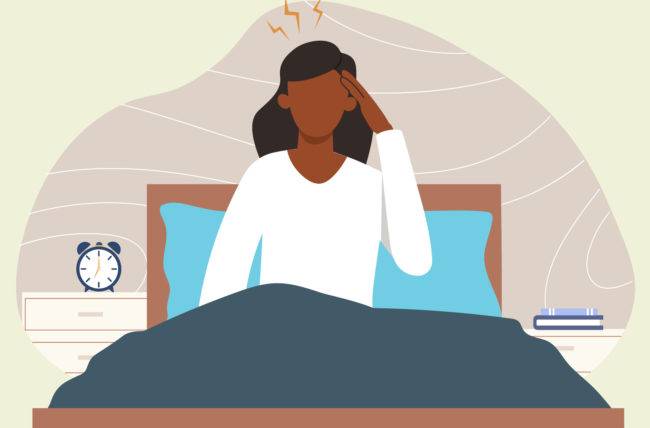Getting out of bed can be enough of a struggle. Waking up dizzy only makes it harder. “Dizziness is one of the most common reasons people seek medical care, but there could be many causes,” says audiologist Julie Honaker, PhD. “As we get older, we’re more susceptible to medical conditions and blood pressure issues that cause morning dizziness.”
If you wake up dizzy once in a while, you probably don’t need to worry. Most people have some occasional dizziness in the morning. But maybe you’re regularly waking up dizzy. Common causes of feeling dizzy after waking up include:
- Low blood pressure.
- Benign paroxysmal positional vertigo (BPPV).
- Dehydration.
- Medication.
- Sleep apnea.
- Heart failure.
Dr. Honaker explains the connection between these causes and those wobbly feelings, plus what you can do to find relief.
What is dizziness?
Dizziness is subjective, says Dr. Honaker. How you experience dizziness may be different from someone else. “People who experience lightheadedness, vertigo or imbalance may describe it as dizziness. But it really is its own definition,” she explains. “The best way to describe dizziness is a feeling of impaired or disturbed spatial orientation relative to your surroundings.”
In other words, dizziness is feeling funny or weird in the space around you. Vertigo is feeling like you’re spinning or the world around you is spinning with or without your head and body moving.
Why am I dizzy when I wake up?
Dr. Honaker lists the six most common reasons why you may experience dizziness when waking up:
1. Low blood pressure
Sleeping on your back, belly or side can affect your blood pressure first thing in the morning. “Your blood tends to pool in your trunk when you lay down. When you get up, the blood then heads to your legs and abdomen, causing a drop in blood pressure,” explains Dr. Honaker. “Normally, the body can restore your blood pressure quickly. But when it happens too sluggishly, it’s called orthostatic hypotension, which can make you feel dizzy.”
Low blood pressure — also known as orthostatic hypotension or postural hypotension — is more common in older adults. It may also occur if you:
- Take some types of medications (like some antidepressants or diuretics).
- Have certain health conditions, such as heart problems or nervous system disorders.
But Dr. Honaker says it’s not a cause for alarm. “While orthostatic hypotension can cause uncomfortable feelings of dizziness or lightheadedness when waking up, it’s only temporary. It should last just a few minutes, but it is good to talk to a healthcare provider if you’re experiencing these sensations on a regular basis.”
2. Benign paroxysmal positional vertigo (BPPV)
This condition can cause dizziness when you wake up. BPPV is an inner ear problem. Your inner ear balance (vestibular) system has five sensory organs in each ear:
- Three semicircular canals: Fluid fills each of these canals. When your head moves, the fluid moves, too. Your brain then knows your head’s position and how to stay balanced.
- Two otolith organs: These organs contain dense particles called otoconia. Otoconia are crystals that help you sense gravity changes and maintain balance. These crystals can break off from the otolith organs and travel into other parts of your ear, including the semicircular canals. This movement can cause vertigo.
“The feeling typically lasts for a few seconds to a minute. It calms down as the crystals settle in another part of the ear. People with BPPV may also notice dizziness when they first get into or roll over in bed,” Dr. Honaker notes. “BPPV can cause other debilitating symptoms, including nausea and vomiting and trouble walking straight.”
If you experience these symptoms, Dr. Honaker recommends talking to your healthcare provider.
“Specialists such as audiologists and physical therapists can diagnose this condition,” says Dr. Honaker. “They can also help you do head and body movements that shift the crystals back to where they belong.”
3. Dehydration
When you don’t drink enough fluids, your blood volume decreases — along with your blood pressure. Low blood pressure means your blood circulates to your brain slower, causing you to feel dizzy when you wake up.
But the antidote is simple. “It can take time to rehydrate the body, so drink more and eat well throughout the day. If you’re extra dehydrated, an IV with electrolytes may also help,” says Dr. Honaker. “If you’re older, choose a time to stop drinking before bed. Then, you won’t have to get up as much during the night to use the bathroom.”
4. Medication
Some medications can cause dizziness after waking up due to their effect on blood pressure or interactions with other medications. These medications include:
- Antibiotics.
- Antidepressants.
- Anti-epileptics.
- Antipsychotics.
- Antiretroviral medications.
- Diuretics.
- Immunosuppressants.
- Opioid pain relievers.
“If you think your medication is causing your dizziness, your primary care provider should be your home base,” says Dr. Honaker. “Your provider can help you figure out if any medications are responsible for your symptoms.”
But don’t just stop taking your medications. See your healthcare provider to discuss the next steps.
5. Sleep apnea
If you have sleep apnea, you don’t breathe consistently during sleep. Sleep apnea can prevent your blood from getting enough oxygen, leading to dizziness, lightheadedness or feeling like you could pass out.
“Sleep apnea can also cascade to other problems such as headaches, which can also cause dizziness,” adds Dr. Honaker.
6. Heart failure
When you have heart failure, your heart can’t pump enough blood for your body’s needs. This problem can cause blood pressure issues, which may lead to dizziness when you change positions.
“There’s a known connection between heart failure, imbalance problems and increased falling risk,” says Dr. Honaker. “People with cardiovascular issues are more susceptible to feeling dizzy and having balance problems.”
What to do if you wake up with dizziness
If you experience dizziness when you wake up, your healthcare provider should be your first stop.
“Your provider can check how your blood pressure responds to changes in position,” says Dr. Honaker. “They can also rule out other problems such as heart issues.”
Experiencing dizziness after waking up also increases your fall risk. To help prevent falls, Dr. Honaker advises getting your sea legs before walking or turning after you get up.
“Stand up slowly and pause,” says Dr. Honaker. “Make sure you have your bearings and that you don’t have any symptoms. After you do this self-check, you should be good to go.”




